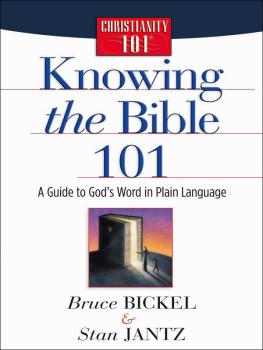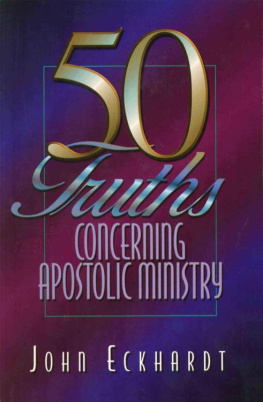Understanding
GODS WORD
An Apostolic Approach
to Interpreting the Bible
Understanding
GODS WORD
An Apostolic Approach
to Interpreting the Bible
D AVID K. B ERNARD
Understanding Gods Word
by David K. Bernard
2005, David Bernard
Hazelwood, MO 63042-2299
Reprint History: 2010
Cover Design by Simeon Young, Jr.
Unless otherwise indicated, all quotations of Scripture are from The Holy Bible, New King James Version, copyright 1984 by Thomas Nelson, Inc.
All rights reserved. No portion of this publication may be reproduced, stored in an electronic system, or transmitted in any form or by any means, electronic, mechanical, photocopy, recording, or otherwise, without the prior permission of David K. Bernard. Brief quotations may be used in literary reviews.
Printed in United States of America
Printed by
Library of Congress Cataloging-in-Publication Data
Bernard, David K., 1956
Understanding Gods word : an apostolic approach to interpreting the Bible / David K. Bernard.
p. cm.
Includes bibliographical references (p. ) and index.
ISBN-13: 978-1-56722-662-1 (pbk. : alk. paper)
ISBN-10: 1-56722-662-0 (pbk. : alk. paper)
1. BibleHermeneutics. I. Title.
BS476.B46 2005
220.6'01dc22
2005019973
Pentecostal Theology Series:
Vol. 1: The Oneness of God *
Vol. 2: The New Birth *
Vol. 3: In Search of Holiness *
Vol. 4: Practical Holiness: A Second Look
A Study Guide for the New Birth
A Study Guide for the Oneness of God
The Oneness of God and Study Guide
The New Birth and Study Guide
Booklets:
Essentials of Oneness Theology
Essentials of the New Birth *
Essentials of Holiness
Essential Doctrines of the Bible *
Understanding the Articles of Faith
Commentaries:
The Message of Colossians and Philemon
The Message of Romans
Preaching the Apostolic Faith
Teaching the Apostolic Faith
Other Books
The Apostolic Life
Gods Infallible Word
Growing a Church
A Handbook of Basic Doctrines *
A History of Christian Doctrine, Vol. 1, 2, & 3
In the Name of Jesus
Justification and the Holy Spirit
Oneness and Trinity, A.D. 100-300
The Oneness View of Jesus Christ
Spiritual Gifts *
The Trinitarian Controversy in the Fourth Century
Understanding Gods Word
CD-Rom
An Introduction to Apostolic Pentecostal Theology
Pentecostal Digital Library, Vol. 1 Complete Works by David K. Bernard
Pentecostal Pulpit Series, Vol. 3
* Literatura disponible en Espaol
Order from:
Pentecostal Publishing House
c/o CNI
5584 Mt. View Rd.
Antioch, TN 37013-2311
Call: 866.819.7667
Fax: 615.641.5566
E-mail:
Or Visit: www.pentecostalpublishing.com
Contents
Our understanding of the Bible is the foundation for everything we believe and practice. The principles and methods of scriptural interpretation that we choose, consciously or unconsciously, will significantly influence what we believe. Therefore, it is important for us to examine how we interpret the Bible and to justify the means that we employ.
This book is for Christians who accept the Bible as the inspired Word of God. As such, it is a sequel to my earlier book, Gods Infallible Word, which discusses the inspiration, authority, canon, and text of the Bible.
That book argues for acceptance of the Bible as infallible and authoritative. Likewise, the present book affirms that the Bible is completely true and that God expects us to believe it and apply it to our lives today. Since we accept the authority of Scripture, we should base our principles of interpretation on Scripture.
We start with an understanding that the Bible is Gods Word, based on internal and external evidence (discussed in Gods Infallible Word ). With this foundation, we look to the Bible itself for guidance as to how God expects us to understand it. Next, we test our findings to see if our preunderstanding is consistent with the principles of interpretation that we have derived and to develop an understanding of Scripture that is consistent and coherent.
While it may seem somewhat circular to interpret Scripture by deriving principles of interpretation from Scripture, we are actually using a heuristic approach (learning through investigation) to focus our understanding more clearly. We can draw an analogy to the scientific method. That is, we observe certain phenomena (the truthfulness and transforming power of Scripture), formulate a hypothesis to explain the phenomena (the divine inspiration and authority of Scripture), test the validity of the hypothesis (in part, by deriving principles of interpretation from Scripture), and reach a conclusion (integrate these principles into a consistent understanding of Scripture). From this point forward, we use biblically based hermeneutics to explore the full message of Scripture.
While this book is not primarily a research project, I have read extensively in this area, and I am indebted to the thoughts of many authors. In particular, I have read in their entirety all the works cited in the bibliography except for those listed under the reference sectionand I have consulted all of those, either in a present or previous edition. I wrote or edited all the works cited in the Oneness Pentecostal section except the last one, which was produced under my direction and to which I contributed.
Some of the basic material in this volume originated with a class entitled Biblical Introduction and Interpretation, which I taught at Jackson College of Ministries in the early 1980s. I used Protestant Biblical Interpretation by Bernard Ramm as a text, and consequently it is an important resource for several chapters. The content of chapters 4 and 5 was particularly developed while teaching and interacting at Urshan Graduate School of Theology, especially lecturing in the Biblical Interpretation class taught by Professor David Norris. Most of chapter 8 comes from New Testament Foundations, a class I teach at Urshan Graduate School of Theology.
My study of hermeneutics has reinforced my belief that the Apostolic Pentecostal understanding of Scripture is the most valid. Therefore, two major goals of this book are (1) to contribute to the development and enunciation of Apostolic hermeneutics and (2) to demonstrate how the careful study and application of hermeneutics supports the distinctives of the Apostolic message.
The word of God is living and powerful (Hebrews 4:12). The Bible is the living Word of God, and as such it has power to transform our lives and impart new spiritual life. It is able to make us wise for salvation through faith which is in Christ Jesus, and it is profitable for doctrine, for reproof, for correction, for instruction in righteousness, that the man of God may be complete, thoroughly equipped for every good work (II Timothy 3:15-17).



















